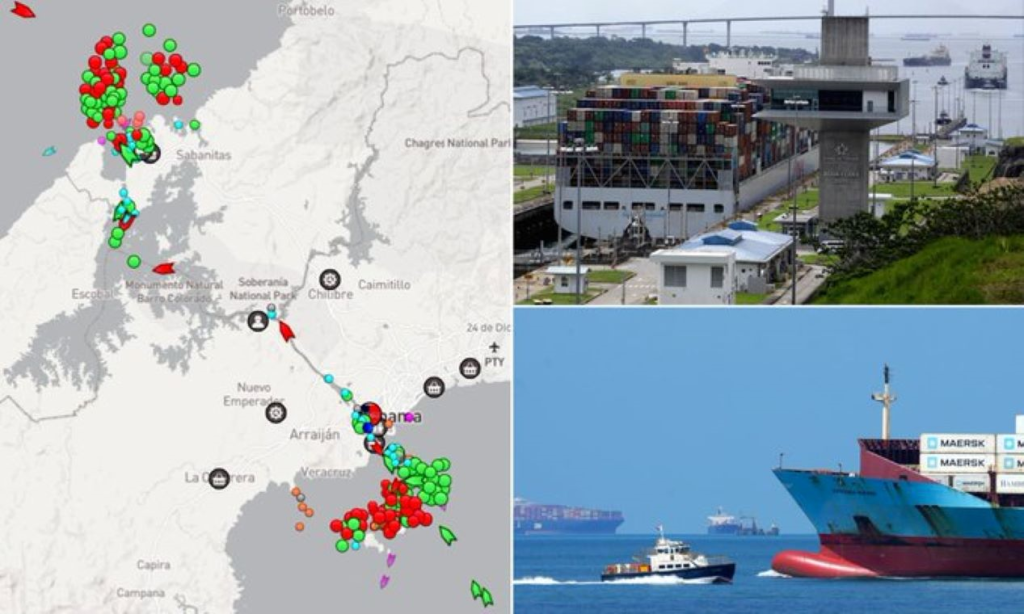An aerial snapshot of the Panama Bay area will reveal a queue of ships waiting at the two inlets of the canal for their turn to have a passage.

However, the queue has gotten so long that shipping companies are now starting to bid in order to boost their position on the passage list. A Japanese shipping company was reported to have paid $4 million for passage preference.
What is the Panama Canal?
The Panama Canal is a standard gauge passageway located in the city of Panama. This Canal is both important and popular because it saves ships transit time and cost.

The Panama Canal is an artificial waterway, stretching out for 51 miles, that connects the Pacific and Atlantic oceans. Now, more than ever, the Canal has become a top earner for the region.
ALSO READ: Car Rental Company Hertz Wrongly Accused a Marine Veteran and Got Him Jailed
How the Price Regime Changed
Of course, ships do not always bid for passage through the Panama Canal. However, there is a statutory amount charged for each ship that passes through the man-made Canal.

These charges also serve as seed for the maintenance and running of the facility. Unfortunately, a drought has been responsible for the queue that has lately appeared on the Canal entrances.
A Canal that Runs on Freshwater
The large volume of water that helps operate the locks of the Canal is dammed into a freshwater body called Gatun Lake.

This lake holds millions of gallons of freshwater that helps ships transition between the Pacific and Atlantic oceans. However, with the passing of each ship, some of the lake’s freshwater is lost to the sea.
POLL — Is Artificial Intelligence a Net Positive or Negative for Mankind?
Lake Gatun is Shrinking
Over the years, freshwater levels in Gatun Lake have been maintained by annual rainfall. Likewise, the lock systems have been redesigned and improved to reduce freshwater loss to the sea.

Unfortunately, global rise in temperature has increased the evaporation of freshwater from the lake, while local annual rainfall has experienced a drop.
Reducing Strain on the Facility
As of August 2023, authorities have reduced the daily passage of vessels through the Canal, all thanks to low water levels.

During the rainy seasons, the Canal allows up to 36 vessels per day, but the figure now lingers around 25 vessels. From projections, the traffic may even be reduced to 18 vessels per day if the situation doesn’t improve by February 2024.
A Daily Accumulating Queue
Reports claim that as of September, there are about 200 vessels waiting in line at both the Pacific and Atlantic entrances of the Canal.

Some shipping companies have, however, devised a method of skipping the queue and obtaining priority of passage. To achieve these, they offer extra amounts to the regular passage charge for each vessel.
ALSO READ: Migrants are Starting to Ditch the American Dream for a Home Return
Bid to Pass!
A report from August claims that the normal toll for a vessel was $400,000. However, there are also claims that some shipping companies have submitted bids ranging between $400,000 and $4 million.

The Japanese shipping company, Eneos Group, made a bid of $3.975 million, which is exclusive of the normal toll for each vessel.
Not Everyone Can Afford Expensive Bids
A concerned CEO, Oystein Kalleklev, recently lamented how much the drought and ever-rising bid is causing delays at the already strained Canal.

Some ships have spent well over a month on the queue, as they are unable to match up the expensive bids being made by other freight companies. So, until the drought improves, the trend is likely to continue.
El Niño, the Climate Fiery
The company managing the Canal, the Panama Canal Company, has laid the blame of the traffic at the feet of a climate pattern called El Niño.

The El Niño phenomenon is a pattern of climatic changes that causes droughts in regions around the Pacific Ocean. Similar droughts have been experienced by fishing communities along the banks of the Amazon river.
Expensive Christmas Purchase?
Since about 40% of US containers pass through the Panama Canal, there are projections that the high bids being paid by shipping companies may reflect on the price of commodities.

For example, companies that cannot afford to lose their market may opt for making huge passage bids than allow their containers to sit for months at the Panama bay.
A Canal that Affects Global Trade
It should not come as a surprise if the prices of some goods skyrocket during the holiday sales.

In contrast, companies that decide to wait their turn on the Panama queue will have their goods arrive late. Pending new arrivals, scarcity of such goods may eventually drive up prices. It is interesting how an isolated event can affect the economics of trade around the globe.
You Might Also Like:
- How Demon Slayer: Infinity Castle Became a Blockbuster & the Biggest Anime Ever
- Global Citizen Festival 2025: Shakira & Cardi B Lead NYC’s Fusion of Music and Activism
- Tim Burton & Monica Bellucci Split After Two Years Together: A Gothic Romance Ends
- Colin Farrell & Margot Robbie Reveal Regret Over Cut Dance Scene in A Big Bold Beautiful Journey
- Afrobeats Dominates UK Charts: Rema, Ayra Starr & More Lead a Global Takeover

